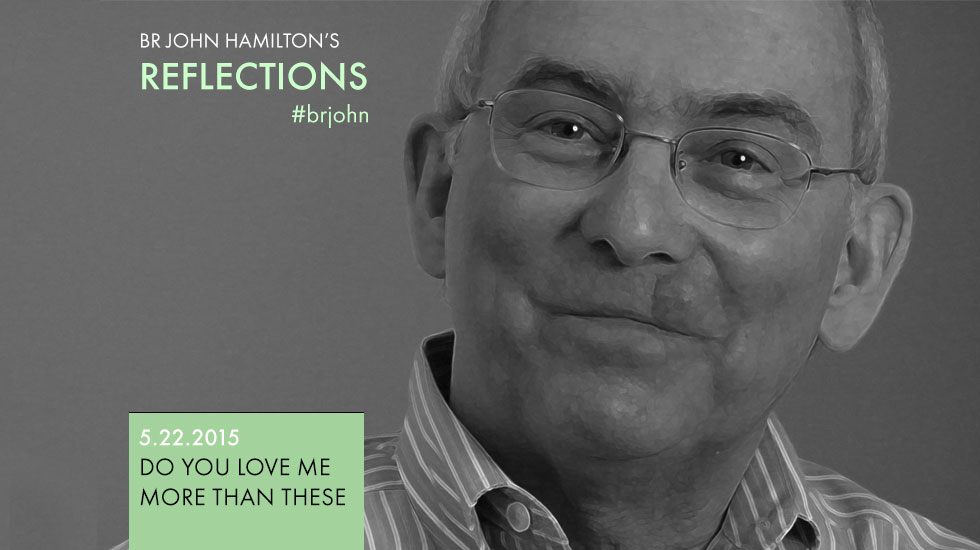Jesus said to Simon Peter, “Simon, son of John, do you love me more than these?”
John 21: 15
At the core of discipleship is the questions of Jesus to Simon Peter, “Do you love me more than anyone or anything else?” We know that in his betrayal Peter had demonstrated that he did not yet love Jesus more than his social standing and his life. So, in his series of three questions, Jesus draws Peter deeply, and it seems painfully, into the very core of his being. We shall follow and lay down our lives for the one whom we love above all else. We know in the moment of “trial” where our heart truly lies.
As I read this dialogue between Jesus and Peter, I realize how difficult it would be to answer, as did Peter,” Lord, you know everything; you know that I love you.” (v. 17) At every moment where I am selective and measured about which sheep I feed, I betray that it is not yet Jesus whom I love more than anything else. When my fears, my personal inclinations or biases, or my prejudices determine my actions, I experience that I cannot yet say “Lord, you know everything; you know that I love you.” For the Lord does know my heart, even in those places that I don’t.
A measure of the difficulty we have with the demand of Jesus for total love is how we have in the Roman tradition turned this passage into an apologetic for our own institutionalization of the gospel. It is with great strain that we turn Jesus’ call for absolute devotion and abandonment to him into the creation of institutional hierarchy. No one else can answer the call of Jesus for us. The cost of discipleship is our “very life.” It cannot be avoided by conformity to any kind of societal or ritualistic norms, however good they may be. None of which is to say that the role of a good and true formation tradition is not vital. But at some point, we must stand before the Lord who asks us the questions which he here asks Simon Peter: “Do you love me more than these?” That is, do you love me even more than all that you and your culture or society hold as right and true?
On May 23, 1996 Islamic fundamentalists in Algeria announced, in praise of God, that they had murdered the Trappist monks of the monastery of Tibherine. This monastery had been established, in the description of Robert Ellsberg, “to bear witness to the One God of all and to the ideal of friendship among all God’s people.” It was a community of shared life and prayer among Muslims and Christians. The founder and superior of the monastery, Father Christian de Chergé, in his last testament, wrote of how, in his life in Algeria in which he and the other monks shared life and prayer with believing Muslims, he had found “there so often that true strand of the Gospel I learned at my mother’s knee, my very first Church.” What is the “true strand of the Gospel which Father Christian found? It is the one love of God in Jesus that is for all, without exclusion or exception. To love Jesus more than anyone or anything else is to truly discover that God’s love is common to all.
My life has no more value than any other. Nor any less value. In any case, it has not the innocence of childhood. I have lived long enough to know that I share in the evil which seems, alas, to prevail in the world, even in that which would strike me blindly. I should like, when the time comes, to have a clear space which would allow me to beg forgiveness of God and of all my fellow human beings, and at the same time to forgive with all my heart the one who would strike me down.
I could not desire such a death. It seems to me important to state this. I do not see, in fact, how I could rejoice if this people I love were to be accused indiscriminately of my murder. It would be to pay too dearly for what will, perhaps, be called “the grace of martyrdom,” to owe it to an Algerian, whoever he may be, especially if he says he is acting in fidelity to what he believes to be Islam. I know the scorn with which Algerians as a whole can be regarded. I know also the caricature of Islam which a certain kind of Islamism encourages. It is too easy to give oneself a good conscience by identifying this religious way with the fundamentalist ideologies of the extremists. For me, Algeria and Islam are something different; they are a body and a soul. I have proclaimed this often enough, I believe, in the sure knowledge of what I have received in Algeria, in the respect of believing Muslims—finding there so often that true strand of the Gospel I learned at my mother’s knee, my very first Church.
My death, clearly, will appear to justify those who hastily judged me naive or idealistic: “Let him tell us now what he thinks of it!” But these people must realize that my most avid curiosity will then be satisfied. This is what I shall be able to do, if God wills—immerse my gaze in that of the Father, to contemplate with him his children of Islam just as he sees them, all shining with the glory of Christ, the fruit of his Passion, filled with the Gift of the Spirit, whose secret joy will always be to establish communion and to refashion the likeness, delighting in the differences.
Father Christian de Chergé
